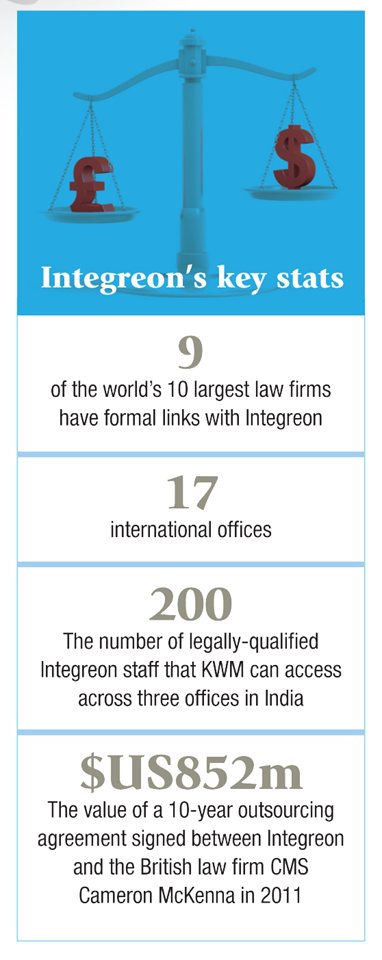Stepping outside
Electronic discovery (e-discovery) is one of the most monotonous parts of a litigation lawyer’s work. Justin Whealing looks at why some firms have decided to outsource much of this work and what other technical help is available outside of the law firm.

It was one of the biggest legal stories last year.
When Mallesons Stephen Jaques, now King & Wood Mallesons (KWM), announced in October that it had entered into an agreement with the legal process outsource (LPO) provider Integreon, the elephant in the room morphed into the rabbit out of the hat.
The agreement, and the public nature in which KWM announced it, meant that links with LPO providers, which not too long ago were a furtive topic of discussion in law firms, had become a badge of honour as firms could demonstrate they were serious about keeping costs down for blue-chip clients involved in large pieces of litigation.
Part of the rationale for striking up agreements with LPO providers was to outsource the monotonous, time-consuming work that teams of young lawyers were doing around due diligence, document review, document processing, and physical and electronic discovery.
Integreon offered Mallesons a legally-trained workforce that could be deployed at a fraction of the cost of its young lawyers. The law firm also sold the arrangement as a way of offering its young lawyers exposure to a greater volume of high-end work earlier in their careers.
“As a litigator we have been struggling with the undesirable discovery process for many, many years, trying to retain very bright graduates that get bored stiff by doing it,” said senior KWM litigation partner Peter Stockdale to Lawyers Weekly back in October.
“I think Peter’s comments back then were fair enough,” says Michelle Mahoney, the director of legal logistics at KWM.
Mahoney’s brief includes handling LPO arrangements and she says that, nine months after the contract with Integreon was signed, the results have been better than expected.
 “The magic of e-discovery is that it is prolific; in that it is electronic by nature so there is lots of it,” says Mahoney. “The joy of e-discovery is that there are many ways to cull information.”
“The magic of e-discovery is that it is prolific; in that it is electronic by nature so there is lots of it,” says Mahoney. “The joy of e-discovery is that there are many ways to cull information.”
It is not often that the terms ‘joy’ and ‘e-discovery’ are in the same sentence, but Mahoney went on to point out that the joy was to be found on the client’s face when the document review matter could be outsourced at a comparatively cheaper cost.
“This was a way for us to try to reduce the cost of sifting through documents where not all of them are created equal,” she says. “We didn’t select it on the basis of e-discovery (the tie-up with Integreon); we selected them on the basis of reducing the time it takes to review documentation.”
After the agreement with Integreon was announced, the Australian Law Students’ Association (ALSA) and the Law Council of Australia expressed concerns about the impact such an agreement could have on the graduate recruitment program for KWM and all large law firms with similar outsourcing arrangements, such as Corrs Chambers Westgarth and Ashurst.
“No, not at all,” Mahoney answers when asked by Lawyers Weekly if the firm’s agreement with Integreon has resulted in a reduction in KWM’s graduate recruitment intake. “There is no correlation between the LPO decision and grad numbers.”
Shore thing
There are a number of companies that assist law firms with different aspects of e-discovery in Australia, especially on the technical side.

Law In Order is one such company. Its clients include the vast majority of the 30 largest law firms in Australia, with Paul Gooderick, a director with the company, saying that e-discovery is the area of legal technology that is changing the quickest.
“Two years ago we were waiting for our first matter that was one terabyte; now we are waiting for our first matter in the 100 terabytes,” he says “The market has changed dramatically; the cost of storage has come down, tools have been written that can deal with these big expanses of data.”
Like LPO providers, his legal clients are seeking a less expensive and less time-consuming method of conducting the e-discovery process. While he says that Law In Order competes with LPO providers to some extent, it has also piqued interest from law firms that don’t want to go offshore when engaging external sources on the e-discovery process.
“On the one hand, the desire to outsource and the taste for outsourcing is certainly increasing and that doesn’t hurt us because we are an outsource bureau,” he says. “Culturally, if lawyers are attuned to outsourcing, it only helps us.”
While the LPO providers based in Mumbai or Delhi retain a cost advantage over on-shore providers such as Law In Order, globalisation is reducing that gap.
The middle class in India are starting to earn more, salaries are going up for professionals and the cost of doing business for foreign companies in the country is increasing.
What the tech?
While the impact of India’s economic development on legal technology providers globally is still playing out, one area that Law In Order has sought to establish its credentials is around being able to develop technical products that assist law firms to review and process documents.
An unexpected area where Law In Order has picked up work has been around alternative dispute resolution (ADR).
Gooderick says that it has been “a hot topic for a while now” and, like litigation, the e-discovery process is one where parties to a dispute often seek assistance.
“The interesting thing about ADR is that, theoretically, it is supposed to provide a lower cost route to resolution,” says Gooderick. “This ties into some of these technologies that allow us to use a more high-level snapshot of evidence in matters, rather than opening up the documents at ‘folder 1 page 1’ and commencing a review finishing up 150 folders later.”
Law In Order has got plenty of work as a result of the resources boom, with its offices in Perth and Brisbane often being called upon by lawyers or resources companies to help parties to achieve a speedy resolution via ADR, particularly if the dispute arises during the course of a joint venture arrangement that is yet to be completed.
 “These days we are dealing with large buckets of electronic information that we can look at more broadly and more quickly in an electronic sense and then present it to the lawyers at its simplest level,” he says. “The early case assessment category of technology is changing the ADR market quite significantly.”
“These days we are dealing with large buckets of electronic information that we can look at more broadly and more quickly in an electronic sense and then present it to the lawyers at its simplest level,” he says. “The early case assessment category of technology is changing the ADR market quite significantly.”
At KWM, Mahoney also has to keep up to date with technical trends and advancements in the e-discovery process, and her firm has relationships with Law In Order and a number of document services processing companies.
“I am on Twitter, I read blogs non-stop, I attend legal technology seminars,” she says when talking about her day-to-day responsibilities. “You have to be active. I follow all the decisions out of the US around predictive coding and what is happening there and we speak to our vendors around those capabilities.”
Predictive coding is something that both KWM and Integreon employ when going through the e-discovery process.
Predictive coding has become a key area in the e-discovery process. Essentially it involves using computer search technologies to find and highlight important documents in a large-scale document review process. Its importance in preparing evidence for any large-scale litigation matter is crucial.
“Predictive coding is a great example where you can put a document set in and say ‘group all things similar’, she says. “When we use Integreon or our own people, we review documents like that so we group the same things together and you can see why another set of documents are not in the same category. It is very powerful and a key enabler for us.”







